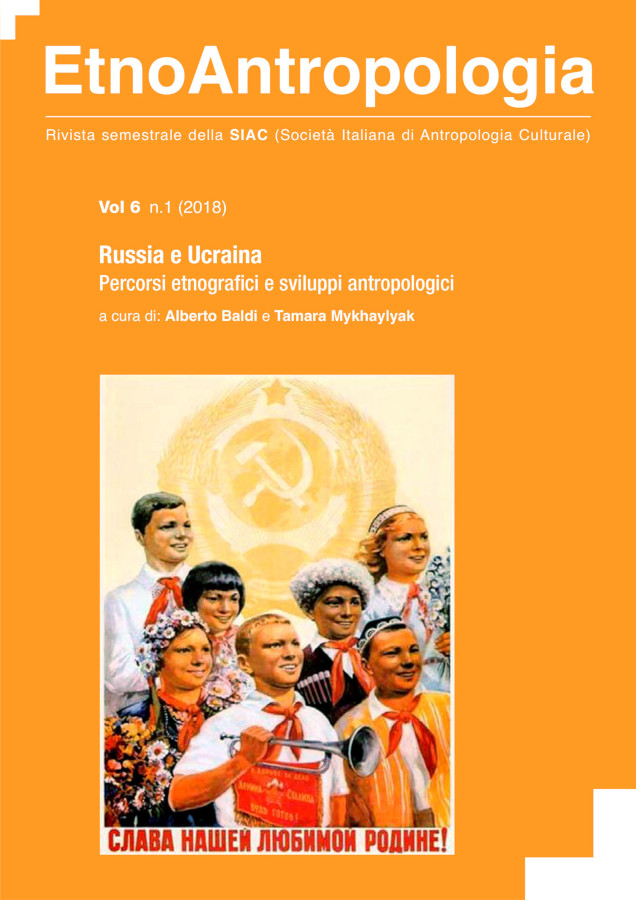The most European place in St. Petersburg: the Museum of Anthropology and Ethnography between the Past and the Future
Parole chiave:
Peter the Great Museum of Anthropology and Ethnography (Kunstkamera) of the Russian Academy of Sciences (MAE RAS), Friedrich Wilhelm Radloff, Lev Sternberg, Movie Atlas of the USSR collection through systematic scientific expeditionsAbstract
The article presents a short survey of the history of Peter the
Great Museum of Anthropology and Ethnography (Kunstkamera) of the
Russian Academy of Sciences (MAE RAS). Today MAE RAS is one of the
largest and oldest ethnographic museums in the world. The richest scientific
collections of MAE RAS (today more than 1.2 million units of storage)
consistently evolved throughout its 300-year history primarily as a result of
intensive expeditionary and research activities of the Academy of Sciences.
The history of Russia in the last three hundred years is also the history of the
Museum. It shared with the country the breakthrough of the Peter the Great
and Catherine epochs, the great achievements for Russian science and culture
of the 19th century, the achievements of the “great era” of Soviet academic
science. The museum remembers the years of Great terror, the horrors of the
Siege of Leningrad, and the difficult times after the collapse of the USSR. The
priority of science in the system of state values, the study and preservation of
national cultures and interethnic dialogue are the key aspects of the Museum's
activities. They always coincided and coincide today with the most important
tasks of Russian statehood.
Riferimenti bibliografici
Arzutov D. V., Alymov S. S., Anderson D. J. 2014, From Classics to Marxism: the Meeting of Ethnographers from Moscow and Leningrad (5–11 April 1929), Saint-Petersburg: MAE RAS.
Lenin V.I. 1975-1977, On the question of nationalities or about
“autonomization” (1922), Full collection of works, Vol. 45. Moscow:
Isdatel’stvo Političeskoj Literatury.
Pasternak E.V., Pasternak E.B. 1990, The Letters of Boris Pasternak,
Moscow: Chudozestvennaja literatura.
Rezvan E.A. 2010, Between Turkestan and Tibet: the Salar People,Saint-Petersburg: MAE RAS.
S.a. 2009, Vladimir Bukovsky: Political correctness is worse than Leninism, http://regions.ru/news/2242306/; last query: 15.11.2014.
Smith L.T. 1999, Decolonizing Methodologies: Research and Indigenous
Peoples, London: Zed Books.
Stanyukovich T.V. 1964, Museum of Anthropology and Ethnography for 250 years, Collection of the MAE, T. XXII, Moscow-Leningrad: 5–151.
Sternberg L. Ya., Oldenburg S.F., Adler B.F., Petri E.L., Lyudevig Yu.V. 1907, The Museum of Anthropology and Ethnography of the Imperial Academy of Sciences during the 12-year management of V.V. Radlov. 1894–1906. To the 70th anniversary of Vasily Vasilievich Radlov on January 5, 1907, Saint-Petersburg.
Sternberg L.Ya. 1912, Museum of Anthropology and Ethnography named after Emperor Peter the Great. Living antiquity, Saint-Petersburg.
##submission.downloads##
Pubblicato
Come citare
Fascicolo
Sezione
Licenza
Gli autori mantengono i diritti sulla loro opera e cedono alla rivista il diritto di prima pubblicazione dell'opera, contemporaneamente licenziata sotto una Licenza Creative Commons - Attribuzione che permette ad altri di condividere l'opera indicando la paternità intellettuale e la prima pubblicazione su questa rivista.
Gli autori possono diffondere la loro opera online (es. in repository istituzionali o nel loro sito web) prima e durante il processo di submission, poiché può portare a scambi produttivi e aumentare le citazioni dell'opera pubblicata (Vedi The Effect of Open Access).





